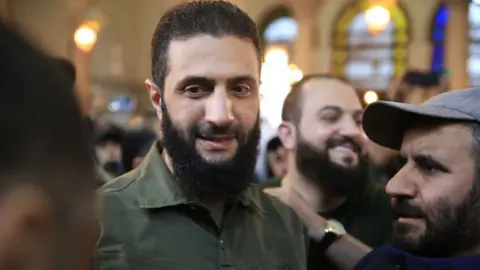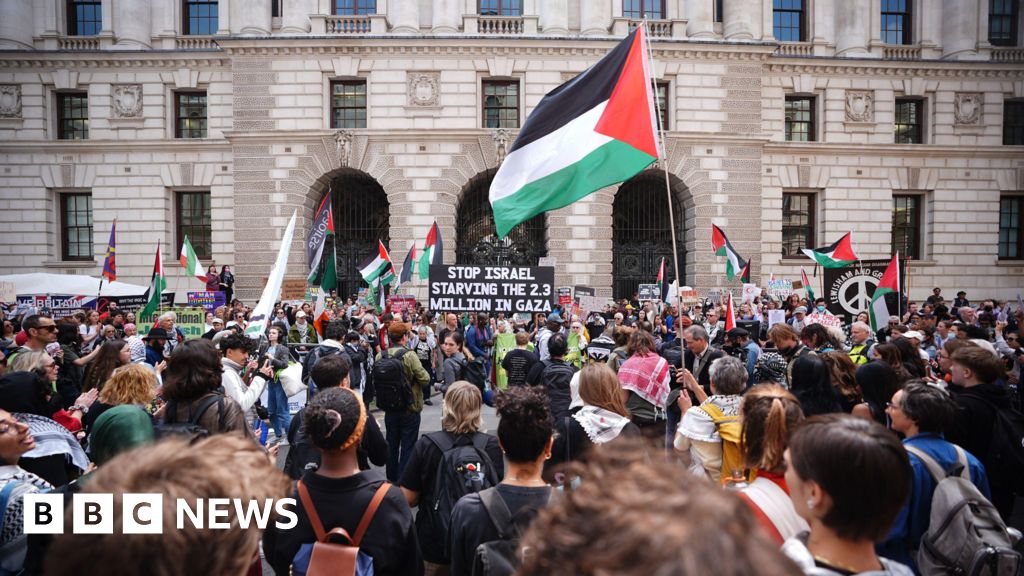ARTICLE AD BOX

 Getty Images
Getty Images
Abu Mohammed al-Jolani leads Syria's Islamist Hayat Tahrir al-Sham (HTS) group
The UK government could remove Islamist militant group Hayat Tahrir al-Sham from the list of banned terrorist groups after the rebels led the overthrow of Bashar al-Assad in Syria.
Cabinet minister Pat McFadden told the BBC the situation in the country was "very fluid" and if it stabilised any change in the ban would be a "relatively swift decision".
Hayat Tahrir al-Sham (HTS) was proscribed as a terror organisation in the UK after being added as an alias of al-Qaeda in 2017.
McFadden confirmed the UK currently cannot have any communications with HTS.
The minister's comments come after Prime Minister Sir Keir Starmer welcomed the end of the rule of al-Assad, who was overthrown and reported to have fled to Russia.
HTS and allied rebel factions seized control of the Syrian capital Damascus on Sunday after years of civil war.
Under the Terrorism Act 2000, the home secretary may proscribe an organisation if they believe it commits or participates in, prepares for, promotes or encourages, or is otherwise concerned in terrorism, and if it is proportionate to do so.
It is a criminal offence to join a group on the list. It is also against the law to arrange a meeting if it is to support the activities of a proscribed organisation.
HTS's leader Abu Mohammed al-Jolani, who has now started using his real name, Ahmed al-Sharaa, cut ties with al-Qaeda in 2016. He has recently pledged tolerance for different religious groups and communities.
When asked by BBC Radio 4 Today programme on Monday if a process to review HTS's designation as a terror group was underway, McFadden said: "Yes, obviously that's got to be considered. They've been proscribed for quite a long time now."
"The leader of that group has distanced himself in a way from some of the things that have been said in the past.
"He is saying some of the right things about the protection of minorities, about respecting people's rights. So we'll look at that in the days to come."
McFadden, chancellor of the Duchy of Lancaster, said the government was not aware of what is going to happen in Syria.
"But obviously if the situation stabilises, there will be a decision to make about how to deal with whatever new regime is in place there," he said.
"I think should be a relatively swift decision. So it's something that will have to be considered quite quickly given the speed of the situation on the ground."
"A lot will depend on whether their statements about the protection of minorities and citizens are backed up."
McFadden also confirmed he was not aware the government had any line of communication through an intermediary with the HTS.
The prime minister's official spokesman said it is "long-standing" government policy not to engage with proscribed organisations, but it keeps the banned list "under regular review".
Former ex-head of MI6 Sir John Sawers told Sky News it would be "rather ridiculous" if the UK was unable to engage with HTS because of the ban.
Shadow foreign secretary Dame Priti Patel said the Conservatives wanted to "put the Syrian people first" and called on the government to review the "security and defence implications as well as the terrorist risks" posed by the rebel groups.
McFadden confirmed there had been "no request" for al-Assad's wife, Asma al-Assad, who holds a British passport, to come to the UK.
He added: "They're in Russia. They've sought asylum there, refuge there, as far as I know. So, it's not an issue that's come up."
Asma, a former investment banker who was born in London, met her husband in the English capital. She has been Syrian first lady since 2000, after al-Assad took over the presidency from his father Hafez, who had ruled since 1971.

 6 months ago
27
6 months ago
27








 English (US) ·
English (US) ·